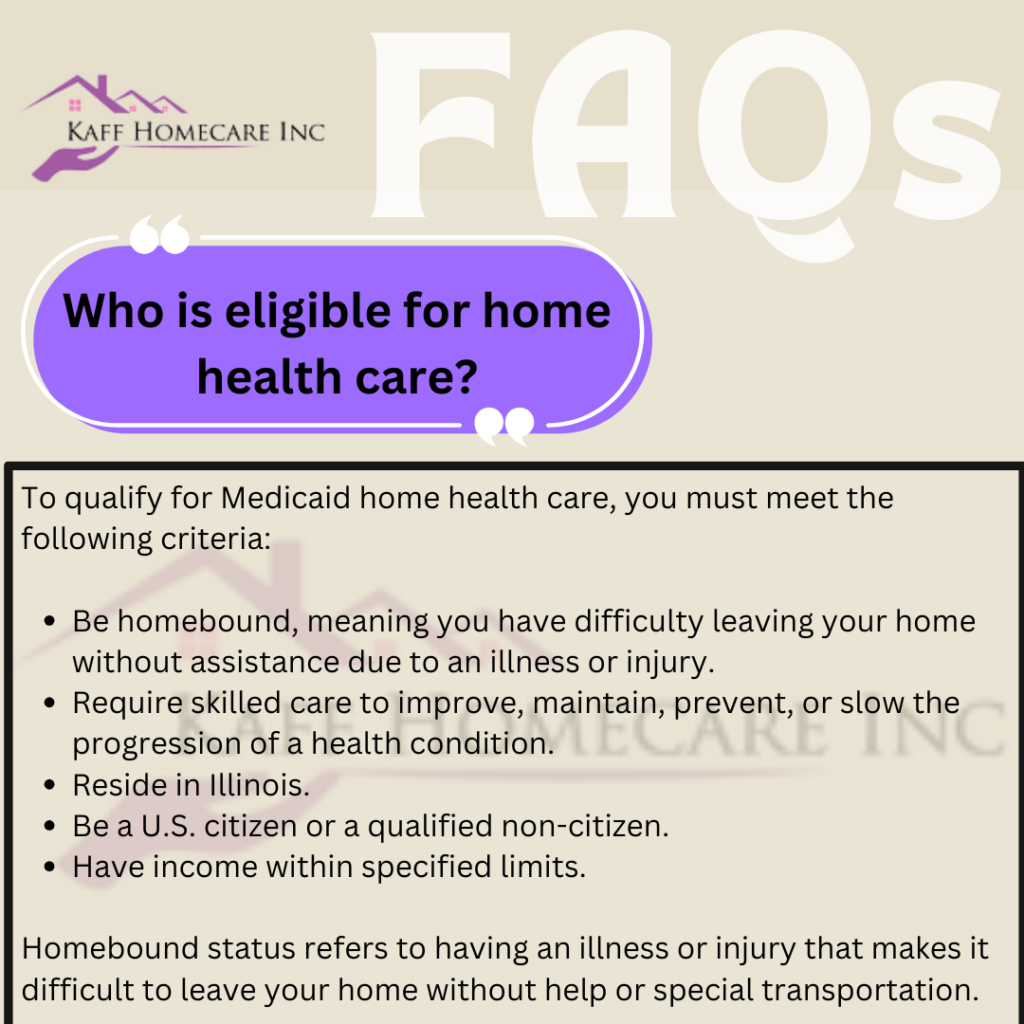Illinois Medicaid provides various home health care services to eligible residents, enabling them to remain in their homes rather than requiring institutional care. Services are offered through programs tailored to specific needs and populations. Here’s a detailed overview:
Contents
Eligibility Criteria
- Residency and Citizenship
- Must reside in Illinois.
- Must be a U.S. citizen or qualified non-citizen.
- Income Limits
- Varies by program and household size.
- Example: Adults aged 19–64 may qualify with incomes up to 138% of the Federal Poverty Level (FPL), while workers with disabilities (HBWD program) may qualify with incomes up to 350% of the FPL.
- Asset Limits
- Asset thresholds depend on the program.
- Example: HBWD allows up to $25,000 in countable assets, excluding a home and one vehicle.
- Specialized HCBS Waivers
- Elderly (60+): Requires nursing facility-level care. Income limits for Nursing Home Medicaid in 2025 are under $1,215/month with assets below $17,500.
- Disabled (59 and under): Must meet disability criteria and require intermediate care.
- Brain Injuries: Designed for individuals needing specialized care.
Covered Services
Medicaid covers a range of in-home services, including:
- Skilled Nursing
- Administering medications, wound care, and managing chronic conditions like diabetes.
- Personal Care Assistance (PCA)
- Help with daily activities (e.g., bathing, dressing) and household tasks (e.g., cooking, cleaning).
- Home Health Aide Services
- Assistance with basic medical care (e.g., checking vitals) and mobility support.
- Therapies
- Physical, occupational, and speech therapies to improve or maintain abilities.
- Medical Supplies and Equipment
- Coverage for durable medical equipment (e.g., wheelchairs, oxygen tanks).
- Medication Management
- Support for obtaining, organizing, and safely using prescribed medications.
- Respite Care
- Temporary care to give family caregivers a break.
- Meal Delivery
- Home-delivered meals and nutritional counseling for those unable to prepare meals.
- Case Management
- Coordinating care plans and connecting individuals to community resources.
- Behavioral and Mental Health Services
- Counseling, therapy, and crisis intervention for mental health conditions.
- Hospice and Palliative Care
- End-of-life support, including pain management and emotional care.
How Services Are Provided
- Services are available through Medicaid programs such as Home and Community-Based Services (HCBS) Waivers, State Plan Services, and Managed Long-Term Services and Supports (MLTSS).
- Access requires:
- Medicaid eligibility.
- Documentation of medical necessity by a physician.
- Coordination by a case manager.
Application Process
- Apply through the Illinois Department of Human Services (IDHS) or Department on Aging (IDoA) based on the program.
- Submit detailed information about income, assets, residency, and medical needs.
Key Takeaways
Medicaid’s home health care services promote independence and dignity for eligible individuals by delivering essential care in their homes. Specific programs address the unique needs of elderly individuals, those with disabilities, or those recovering from brain injuries. For the most accurate and updated information, consult state agencies or official Medicaid resources.




